In brief
On the 12th July 2024, 120 relationship-centred practitioners came together in Birmingham to explore how we can change our permissions to put relationships first. It was a day full of relationships, new and old, solidarity and celebration. Here, we offer our reflections and invite you to share yours. Thank you to everyone who made it such an invigorating day.
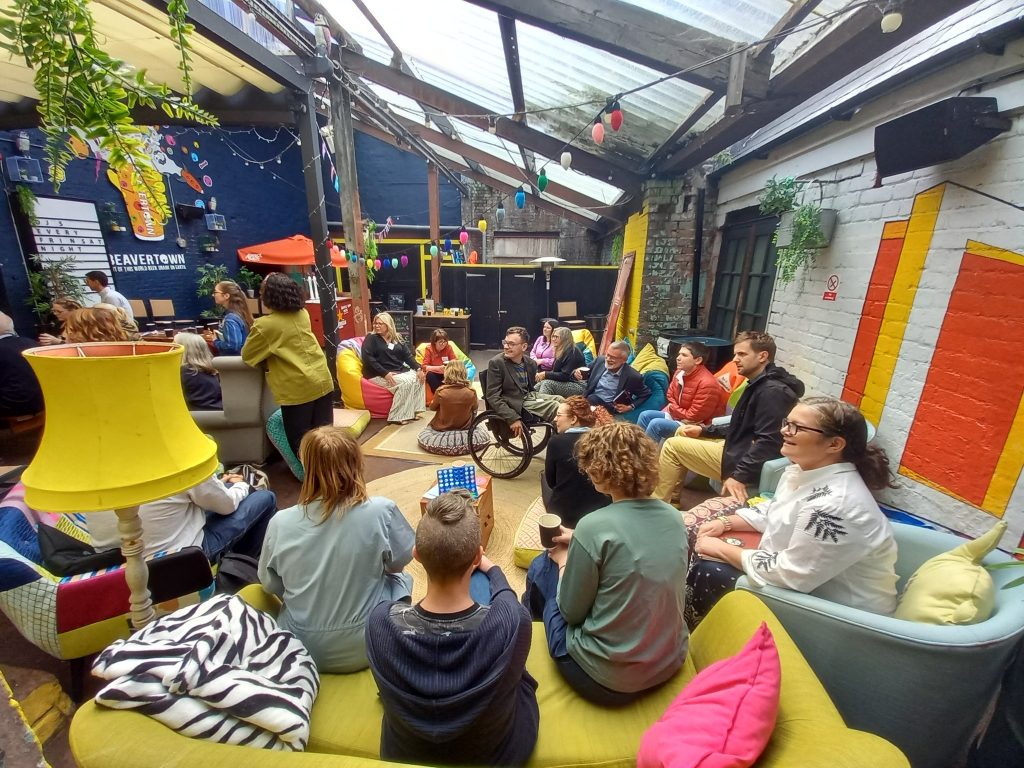
Dear Friends,
We gathered in a pub in Birmingham on the 12th July to explore how we can change our permissions to put relationships first. We examined the rules that get in the way of working relationally, and interrogated which are real, which are assumed, which are necessary, which might be challenged, and where the conversations might be had.
The programme for the day can be found here and summaries of the speaker notes can be found here. And here, for the truly, deeply dedicated, are the collated notes from the breakout sessions in the afternoon.
This letter is in part a memo to self – things we want to remember from the day, think about and do. And in part it is an invitation to people who weren’t with us – things we hope to think about with you, or do together.
These are just some of our takeaways. If you were there, you will have more. If you weren’t, you may have things to ask or to add. Please do share yours in the comments below.
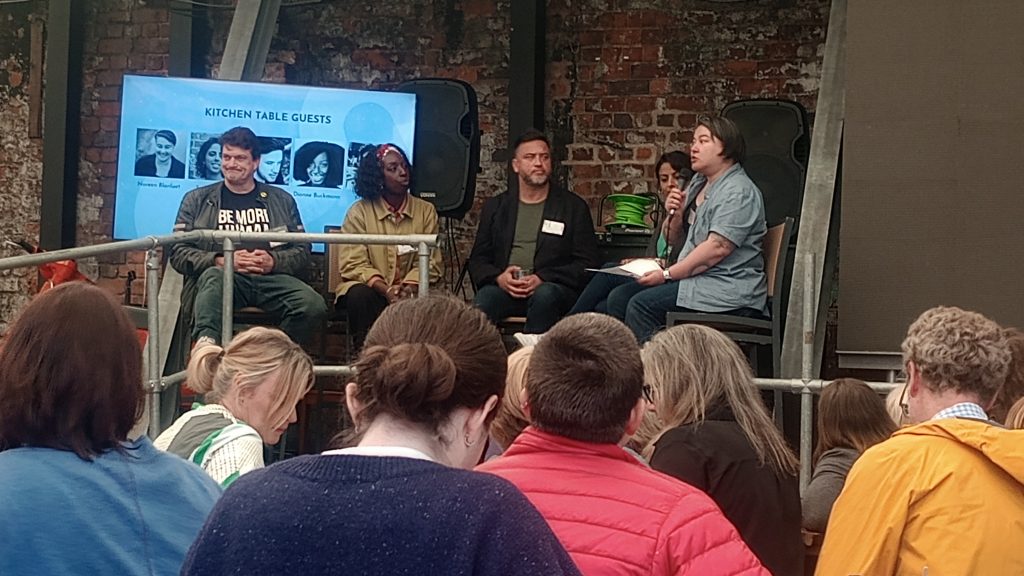
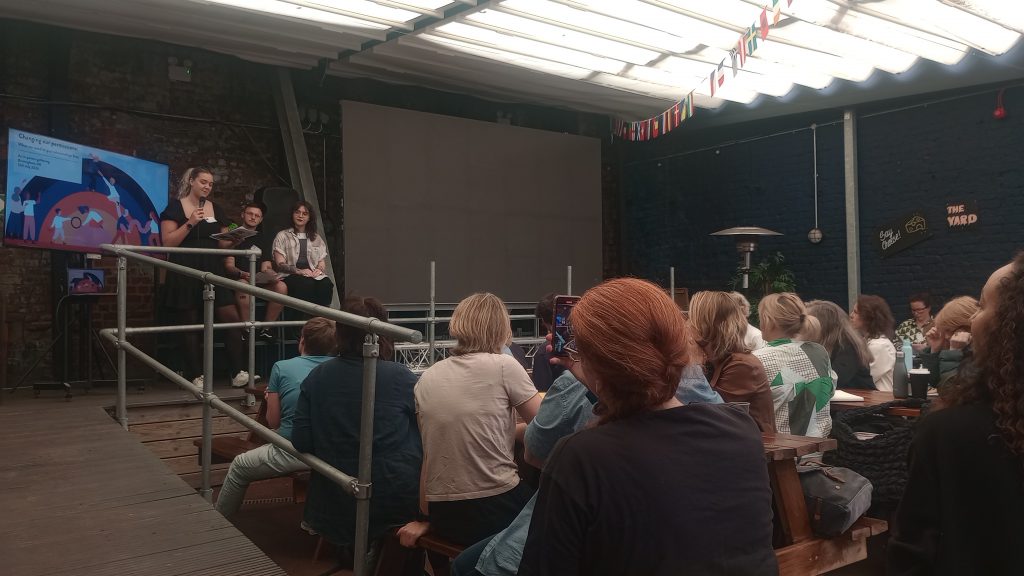
Some things we talked about
Questioning rules
Our mission for the day lay in differentiating between assumed and real rules, challenging unhelpful norms, and creating more effective and humane practices.
My football scarf and my granddaughter both get me into conversations. They’re like a banner that says ‘normal rules do not apply. Let’s have a chat’. Strangers can talk to one another without these things but as a general rule we don’t. As a general rule, we do the damn done thing. But conventions are conventions, not rules. We are free to choose
Some assumed rules look similar to real rules. Changing our permissions doesn’t disregard those rules. It holds them up to the light, asking if they are helpful, who they serve, which parts of the system they are propping up and protecting
-
Where in our org, our community, are we constrained by the assumed rules? Who and how should we challenge?
-
Which are the real rules? Are they the right ones? Are there, even here, conversations to be had?
-
And what’s in the murky patch between the assumed rules and the real ones?
Ping ball
We began the day by hearing from the inspiring young people of ActUp! who are on a mission to transform the mental health system in Coventry and Warwickshire.
Individuals make the difference, not systems. I wanted someone who had permission to be human. Someone who was willing to get to know me. I wanted permission to be human too. Known for who I am. Instead, I was asked invasive questions before I was even asked my name
To provide effective care, we need to emphasise human connection over advanced technology, consistent relational care over a fragmented, impersonal system.
Simplicity theory: People need people
People in the room were working in many different settings – hospitals, warm centres, schools, universities, prisons, community groups, councils, government departments, campaign groups. “£12k people, £120k people and people doing it for love”. Good relationships are the delivery system for us all. Everything works better when relationships work well.
This is not radical
If human connection is radical or innovative, we’re all screwed
And this isn’t ‘Tree Huggery’
Everything works better when relationships work well. We have the proof.
Scaling down
We worry too much about the pursuit of scale and the skills of bigness and not enough, sufficiently early about one to one human relationships and the skills of smallness. In barrelling after scale, we bully out the granular and we lose our best selves.

Moral injury
Genuine emotional availability is draining especially if we are in an organisation or a system that does not recognise the value and importance of relationships and does not support effective and consistent relational practice. Seeking peer support from elsewhere (the Relationships Project for example) isn’t a weakness, it’s a sensible strategy for nourishing and sustaining good work.
Turning to the light whilst staying in the trouble
We have different parts to play. Big organisations like hospitals or local authorities can be hard to change but they are very important to a great many people. Even small adjustments can have wide influence. A world of good relationships will have advocates and provocateurs and above all practitioners, inside and outside the big systems supporting those who are staying ‘in the trouble’ and working together to change existing systems and to build better ones.
It’s ok to be a bit rubbish sometimes
Our partners from Camerados reminded us, throughout the day, that:
It’s important to be a bit shit and not have a problem with it – it’s human to be a bit shit
When we create spaces and systems designed around efficiency and logic models we leave no space to be human; no space for people to embrace their flaws and work through the messiness. We need to start ‘building in a bit of crapness’.
Making the most of this moment
We have a new government and new Prime Minister, newly elected mayors in many regions and rejuvenated councils in many more. None of this makes change inevitable, but all of it creates possibility. Openings and opportunities will ripple out.
We came up with ten things we can do to build strong, change making relationships with the newly elected (and most of them also work for the old hands too).

Some things we decided to do
We invite you to join us in…
Sharing the wisdom
Just like every relationship is unique, our approach to building them must be reflexive and adaptable. There can be no ‘cookie cutter’ approach to relational work: it must be informed by the context in which it is taking place and the people who are involved. Whilst relational work is necessarily shaped by context, there are common ‘patterns’ that we witness across sectors and specialisms; behaviours, competencies and conditions which underpin and enable relationship-centred practice.
The Pattern Library for Relationship-Centred Practice will support practitioners to learn from one another’s hard-earned wisdom so they can better navigate common questions and challenges that arise when working relationally. The first pattern we will begin work on will be around constructive disagreement. If you’d like to contribute, we’d be delighted to hear from you.
Building the relational muscle
We can’t rely on our instincts alone to build relationships in a world teeming with difference and diversity. We must nurture the skills and practice of relationships for our modern world.
Over the coming year, we will be working to build an Academy for relational leadership. The Academy will support future leaders to develop the mindsets, processes and leadership to seize the opportunity to realign around a world that is built for and around relationships. We will be putting a call out for collaborators via our newsletter in the Autumn.
Weaving networks of solidarity
Working in relational ways can be tough, frustrating and lonely, particularly when we’re operating in unrelational systems. The Relationships Map is a space for relationship-centred practitioners to connect, learn and feel part of something bigger. It’s also a space to share shared challenges and identify ways of pooling our wisdom to navigate them.
Meeting again
It can be hard to give ourselves the permission to step away from day-to-day demands to attend an event like this. But the connection, validation, solidarity and support we can offer one another makes it a worthwhile investment. We have dreams of these sorts of gatherings becoming a regular occurrence.
I genuinely do feel like we’ve met our relational working tribe and it feels wonderful!
I’m still energised from Friday! I want more of these kinds of gatherings!
On my way home from a day with with my friendship, purpose and ideas tanks fully topped up
Giving ourselves permission
Some permissions we can unlock straight away – the permission to introduce ourselves as human beings rather than as roles, the permission to listen, deeply and actively, in our interactions, the permission to challenge one another in constructive ways and even the permission to get things wrong – to “be a bit shit sometimes”.
Other permissions will require a more sustained effort to establish, but if we don’t take steps to challenge and change the rules and the norms that get in the way of relational working we will never be the best that we can be.
Sometimes this can be hard, particularly for those who are working in, or with, organisations that are profoundly unrelational and that find change most difficult.
But the number one lesson for many of us in Birmingham on July 12th was a very simple one – we are not alone! Relationship-Centred Practitioners are patiently progressing, across the country and across the sectors, working together and supporting one another. “If you want to go fast, go alone. If you want to go far go together”.
If you haven’t done so already, please sign up for regular updates here and put your work on the map here.
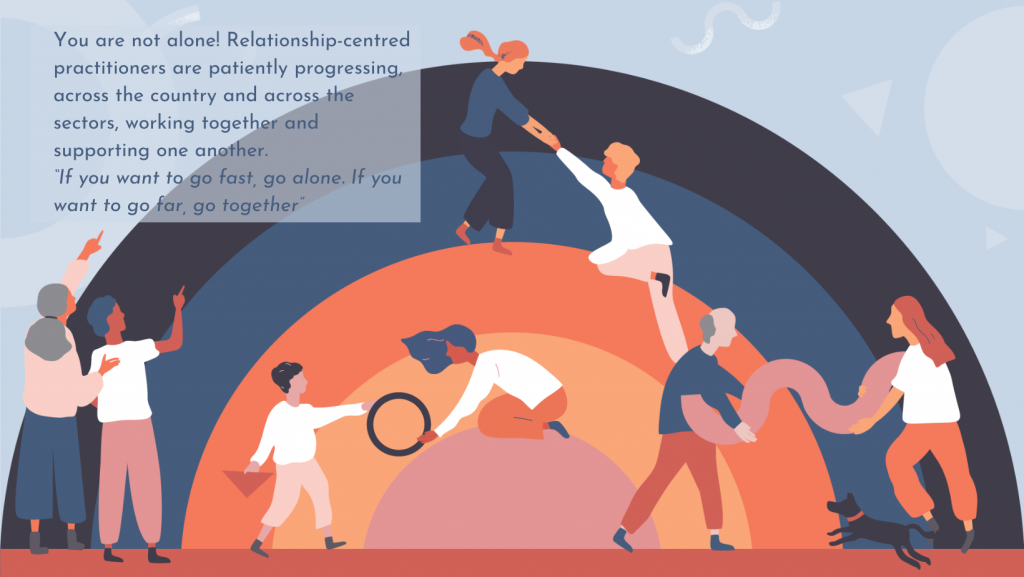
More resources

Changing our permissions
In this blog, we delve deeper into the permissions – real and assumed – that shape our ability to work relationally. We explore unspoken conventions, imaginary rules and real rules, and explore which might be changed and how

Permissions Game
The Permissions Game invites you to explore the rules and norms that influence how you work and what you prioritise via a series of real life scenarios. Gather your team, download the pack and press play!
From the blog
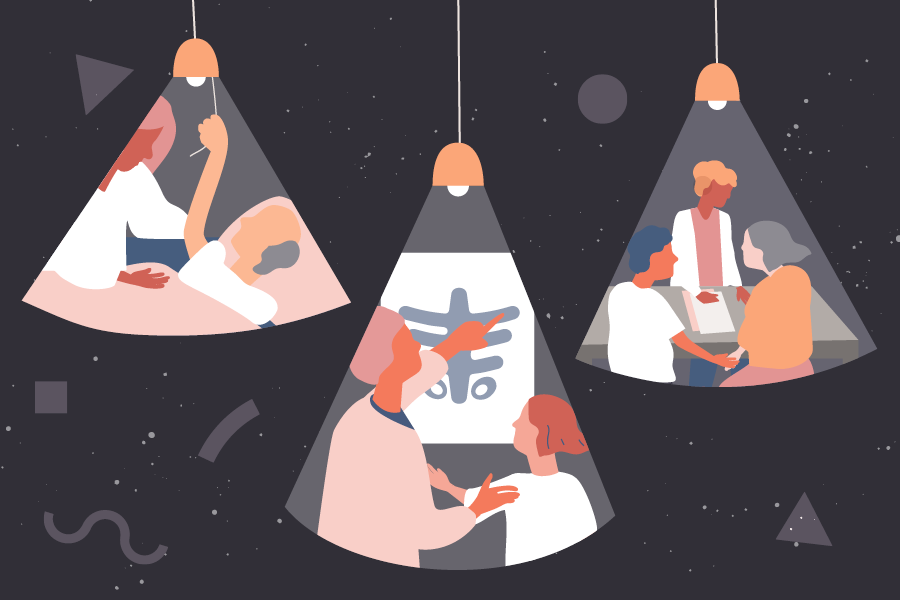
The man in the hospital
David Robinson reflects on a day at the hospital. As Health and Social Care Secretary Wes Streeting consults on the future of the NHS, David makes the case for “critical synergy”. “We want the awesome science”, he says. “We also want good relationships - warmth and...

Our plans for a Relational Practice Academy: Where we’ve got to
In David Robsinon’s LSE lecture in 2023, he talked about the idea of responding to the increasing demand for knowledge about relationship-centred practice by developing a new training institution. We published a blog last autumn setting out more detail and invited...
